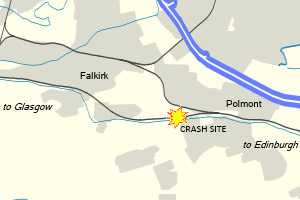
At the Railway accident near Halfweg on 22 November 1972, the locomotive of a work train derailed near Halfweg in North Holland.

At the Railway accident near Halfweg on 22 November 1972, the locomotive of a work train derailed near Halfweg in North Holland.
On 22 November 1972 derailed diesel locomotive No. 2279 (class 2201-2350), which hauled a work train near Halfweg. After the derailment it came in the mud beside the embankment to a standstill. It had to be wrecked in situ. [1] Although the locomotive had just been refurbished in the Tilburg workshops, it could not be salvaged from the accident site, which was very muddy being a combination of peat and swamp. The longer the locomotive was left there, the more it sank into the muddy soil. [2] One bogie had to be left embedded in the mud. [1]

The Union Pacific Railroad, legally Union Pacific Railroad Company and often called simply Union Pacific, is a freight-hauling railroad that operates 8,300 locomotives over 32,200 miles (51,800 km) routes in 23 U.S. states west of Chicago and New Orleans. Union Pacific is the second largest railroad in the United States after BNSF, with which it shares a duopoly on transcontinental freight rail lines in the Western, Midwestern and Southern United States.

Pakistan Railways is the national, state-owned railway company of Pakistan. Founded in 1861 and headquartered in Lahore, it owns 7,791 kilometres of track across Pakistan, stretching from Torkham to Karachi, offering both freight and passenger services.

The Class 66 is a type of six-axle diesel-electric freight locomotive developed in part from the Class 59, for use on the railways of the UK. Since its introduction the class has been successful and has been sold to British and other European railway companies. In Continental Europe it is marketed as the EMD Class 66 (JT42CWR).

The Polmont rail accident, also known as the Polmont rail disaster, occurred on 30 July 1984 to the west of Polmont, near Falkirk, in Scotland. A westbound push-pull express train travelling from Edinburgh to Glasgow struck a cow, which had gained access to the track through a damaged fence from a field near Polmont railway station. The collision caused all six carriages and the locomotive of the train to derail, killing 13 people and injuring 61 others. The accident led to a debate about the safety of push-pull trains on British Rail.

The Staplehurst rail crash was a derailment at Staplehurst, Kent on 9 June 1865 at 3:13 pm. The South Eastern Railway Folkestone to London boat train derailed while crossing a viaduct where a length of track had been removed during engineering works, killing ten passengers and injuring forty. In the Board of Trade report it was found that a man had been placed with a red flag 554 yards (507 m) away but the regulations required him to be 1,000 yards (910 m) away and the train had insufficient time to stop.
The Rafiganj rail disaster was the derailment of a train on a bridge over the Dhave River in North-Central India, on 10 September 2002. At least 130 people were killed in the accident, which was reportedly due to sabotage by a local Maoist terrorist group, the Naxalites.
The Eltham Well Hall rail crash was an accident on the British railway system that occurred on 11 June 1972 at approximately 21:35. An excursion train from Margate to Kentish Town derailed on a sharp curve at Eltham Well Hall station, Eltham, London. The curve had a maximum permitted speed to be taken at 20 miles per hour (32 km/h) but the train was estimated to have been travelling at 65 miles per hour (105 km/h) resulting in the locomotive and all but one of the ten carriages derailing.
The Ealing rail crash was an accident on the British railway system that occurred on 19 December 1973. The 17:18 express train from London Paddington to Oxford—with approximately 650 passengers on board—was derailed while travelling at around 70 mph (110 km/h) between Ealing Broadway and West Ealing. Ten passengers were killed and 94 were injured, and it was Britain's deadliest train crash of the decade until the Moorgate tube crash which killed 45. The cause of the accident was an unsecured maintenance door that had fallen open whilst the train was travelling, after having struck several lineside objects, it struck a Point machine at Longfield Avenue, derailing the entire train.
There have been a number of train accidents on the railway network of Victoria, Australia. Some of these are listed below.
The railways of New South Wales, Australia have had many incidents and accidents since their formation in 1831. There are close to 1000 names associated with rail-related deaths in NSW on the walls of the Australian Railway Monument in Werris Creek. Those killed were all employees of various NSW railways. The details below include deaths of employees and the general public.
The Milton rail crash was a crash in 1955, at Milton, Berkshire. A passenger train took a crossover too fast and derailed. Eleven were killed, and 157 were injured.

The Getå Railroad Disaster was a train disaster caused by a landslide in Getå, a town that is now part of the municipality of Norrköping on 1 October 1918. To date, it is the worst rail accident in Swedish history.

At the Railway accident near Halfweg on 2. November 1966, an electric multiple unit derailed near Halfweg in North Holland.